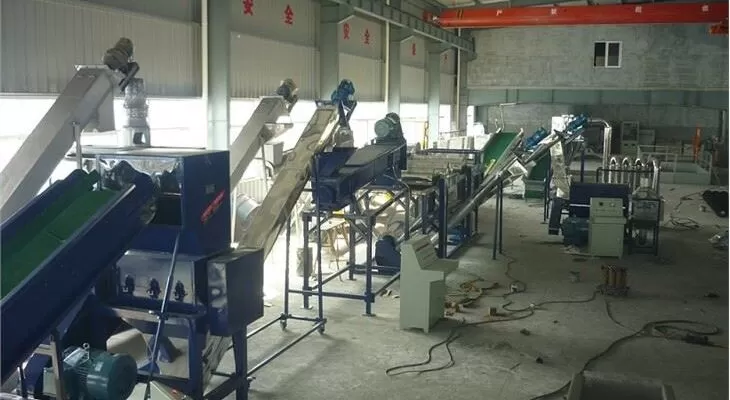Plastic waste is everywhere. It’s in our oceans, filling landfills, and even infiltrating our food chain. Governments and businesses are scrambling to deal with the crisis, but the question remains—are environmental laws enough to combat the mounting plastic problem?

Plastic recycling and environmental laws play a crucial role in reducing plastic pollution. However, existing regulations often fall short of addressing the scale of the problem. It’s clear that we need more effective policies and stronger enforcement to make a meaningful impact.
As the CEO of Amige, a company that designs and manufactures plastic crushers and shredders, I have seen firsthand the complexities of recycling plastic. Let’s dive into the intersection of plastic recycling and environmental laws.
Why is plastic recycling important, and what role do environmental laws play?
Plastic waste is a global issue. Every year, millions of tons of plastic enter our oceans, causing irreparable damage to marine life and ecosystems. Recycling plastic is one of the most effective ways to reduce this waste, but it’s not a one-size-fits-all solution.
Environmental laws can help create a framework for recycling initiatives, but they vary widely by country. For example, countries in Europe have strict regulations that mandate the recycling of specific materials, including plastics source. In contrast, many developing countries still lack comprehensive plastic waste management systems.
How effective are current environmental laws in promoting plastic recycling?
While laws like the European Union’s Plastic Strategy have led to some positive changes, the effectiveness of plastic recycling laws is still debated. Many countries lack the infrastructure needed to implement these laws successfully. Without proper facilities and public education, even the best-intentioned policies fall short.
For example, China’s ban on importing foreign plastic waste has forced many countries to reconsider their recycling processes. This has exposed the gaps in the global recycling system.
What are the challenges in enforcing environmental laws for plastic recycling?
Enforcement is one of the biggest hurdles. Countries may pass laws, but without robust systems in place to monitor and enforce them, they often remain toothless.
Take, for instance, the issue of plastic waste leakage. Many plastics that are theoretically recyclable end up in landfills or as litter, largely due to lack of education and insufficient waste management systems.
Are the penalties for non-compliance with plastic recycling laws strict enough?
The penalties for violating plastic recycling laws vary, and in many cases, they are not severe enough to deter businesses or individuals from improper disposal. Governments often face resistance from industries that prioritize profit over sustainability.
In my experience at Amige, businesses that don’t comply with recycling regulations can face fines and even reputational damage, but this isn’t always enough to change behavior.
What are the gaps in plastic recycling legislation?
Plastic recycling legislation is still evolving. Some laws focus on extended producer responsibility (EPR), requiring companies to take responsibility for the entire lifecycle of their products, including their disposal. However, these laws are often not comprehensive enough to address the full range of plastic waste.
The absence of global coordination is another issue. While some countries have made strides, the lack of international standards makes it difficult to tackle plastic pollution at a global scale.
Can innovation and technology bridge the gap in plastic recycling?
Technology holds promise. New advancements in chemical recycling and AI-driven sorting systems can significantly improve the efficiency of plastic recycling. Chemical recycling, for example, breaks plastic down to its molecular level, allowing for reuse regardless of contamination.
But even with these innovations, effective enforcement of environmental laws is crucial for ensuring that technology is applied correctly.
What role can businesses play in improving plastic recycling?
Businesses have a key role to play in improving plastic recycling. At Amige, we focus on providing top-quality plastic crushers and shredders that help companies process plastic waste more efficiently.
But businesses must also take a proactive approach in following environmental regulations and adopting sustainable practices. Simple actions like using recyclable materials and reducing plastic packaging can have a significant impact.
What can consumers do to help with plastic recycling?
Consumers, too, have a vital role in this equation. The effectiveness of recycling depends heavily on consumer participation. Here’s what individuals can do:
- Educate themselves on what can and cannot be recycled.
- Avoid single-use plastics whenever possible.
- Support businesses that prioritize sustainability.
Consumer habits play a massive role in making recycling laws effective. If consumers don’t support the recycling process, it doesn’t matter how many laws are in place.
How do environmental laws impact plastic recycling practices globally?
Environmental laws are crucial in guiding the practices of businesses and individuals around the world. They ensure that plastic recycling is not only a recommendation but a requirement. In regions with strong regulations, such as Europe, recycling rates are higher, and plastic waste management is more efficient.
However, in places where laws are less strict, plastic waste continues to accumulate at alarming rates. These discrepancies highlight the need for better coordination and stricter global standards for plastic recycling.
Conclusion
Plastic recycling and environmental laws are deeply intertwined. As governments, businesses, and consumers work together, we can improve recycling rates and reduce plastic pollution. But for real change to happen, we need stronger, more effective laws, better enforcement, and the adoption of cutting-edge technologies. Let’s not wait for tomorrow to act—change starts today.
